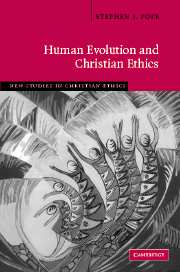Book contents
- Frontmatter
- Contents
- General editor's preface
- Acknowledgments
- Introduction
- Chapter 1 Evolution and religion
- Chapter 2 The indifference of Christian ethics to human evolution
- Chapter 3 Varieties of reductionism
- Chapter 4 Faith, creation, and evolution
- Chapter 5 Chance and purpose in evolution
- Chapter 6 Human nature and human flourishing
- Chapter 7 Freedom and responsibility
- Chapter 8 Human dignity and common descent
- Chapter 9 Christian love and evolutionary altruism
- Chapter 10 The natural roots of morality
- Chapter 11 Natural law in an evolutionary context
- Chapter 12 Sex, marriage, and family
- Bibliography
- Index of scriptural citations
- Index of names and subjects
General editor's preface
Published online by Cambridge University Press: 26 June 2009
- Frontmatter
- Contents
- General editor's preface
- Acknowledgments
- Introduction
- Chapter 1 Evolution and religion
- Chapter 2 The indifference of Christian ethics to human evolution
- Chapter 3 Varieties of reductionism
- Chapter 4 Faith, creation, and evolution
- Chapter 5 Chance and purpose in evolution
- Chapter 6 Human nature and human flourishing
- Chapter 7 Freedom and responsibility
- Chapter 8 Human dignity and common descent
- Chapter 9 Christian love and evolutionary altruism
- Chapter 10 The natural roots of morality
- Chapter 11 Natural law in an evolutionary context
- Chapter 12 Sex, marriage, and family
- Bibliography
- Index of scriptural citations
- Index of names and subjects
Summary
This book is the twenty-eighth in the series New Studies in Christian Ethics. It contains an important dialogue with some of the earlier books in the series, notably Stephen Clark's Biology and Christian Ethics, Colin Grant's Altruism and Christian Ethics and Jean Porter's Moral Action and Christian Ethics. There are also points of mutual concern shared with Celia Deane-Drummond's recent Genetics and Christian Ethics. All of these books closely reflect the two key aims of the series – namely to promote monographs in Christian ethics that engage centrally with the present secular moral debate at the highest possible intellectual level and, secondly, to encourage contributors to demonstrate that Christian ethics can make a distinctive contribution to this debate.
Stephen Pope has already established a firm reputation as a creative Catholic theologian with his book The Evolution of Altruism and the Ordering of Love (1994). His particular contribution in Human Evolution and Christian Ethics is to engage critically and creatively as a natural-law theologian with sociobiologists. Quite a number of the latter have been highly critical of religion in general and of Christian theology in particular. He argues at length that they have often misunderstood (and oversimplified) what theologians today are attempting to do. But he is also aware that theologians themselves have all too often ignored evolutionary science. In contrast, he has read the science carefully and in the process developed a critical but sympathetic Christian ethical approach to sociobiological explanations of purpose and altruism that most other Christians simply ignore.
- Type
- Chapter
- Information
- Human Evolution and Christian Ethics , pp. xiPublisher: Cambridge University PressPrint publication year: 2007



